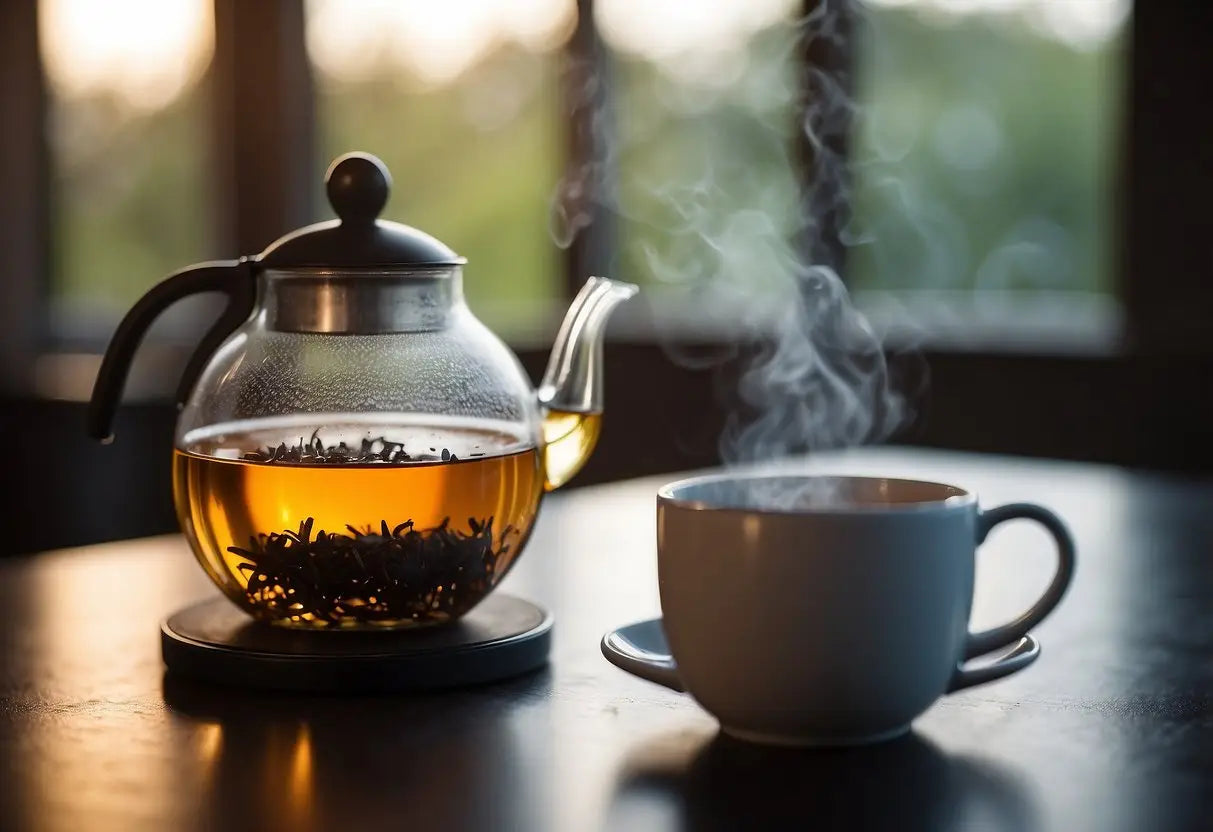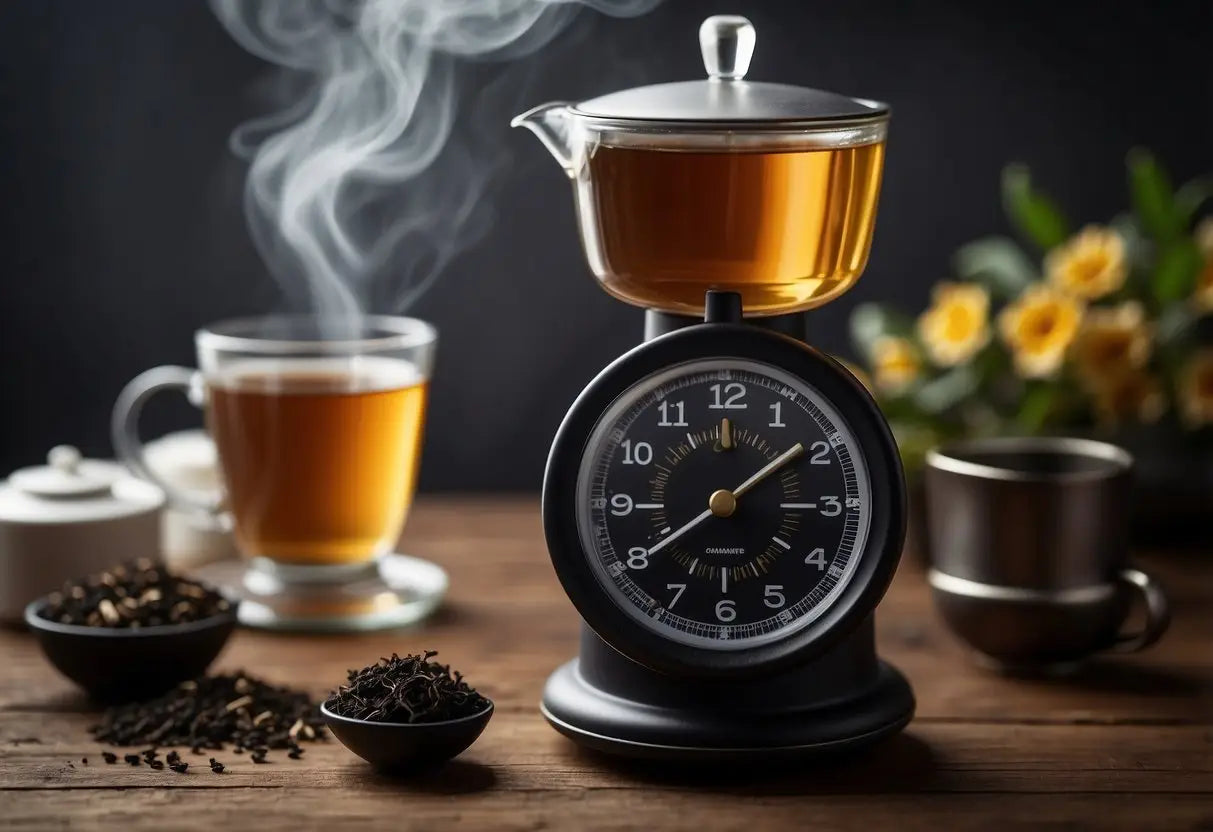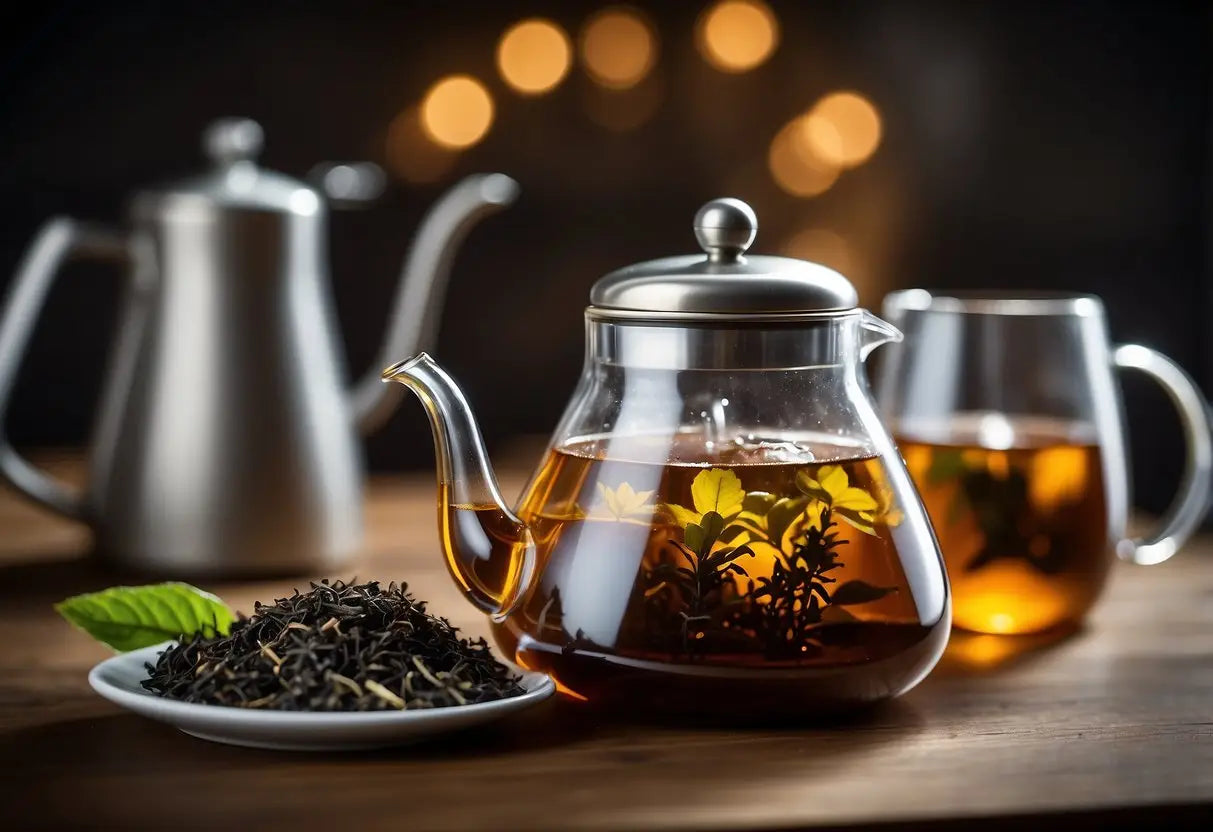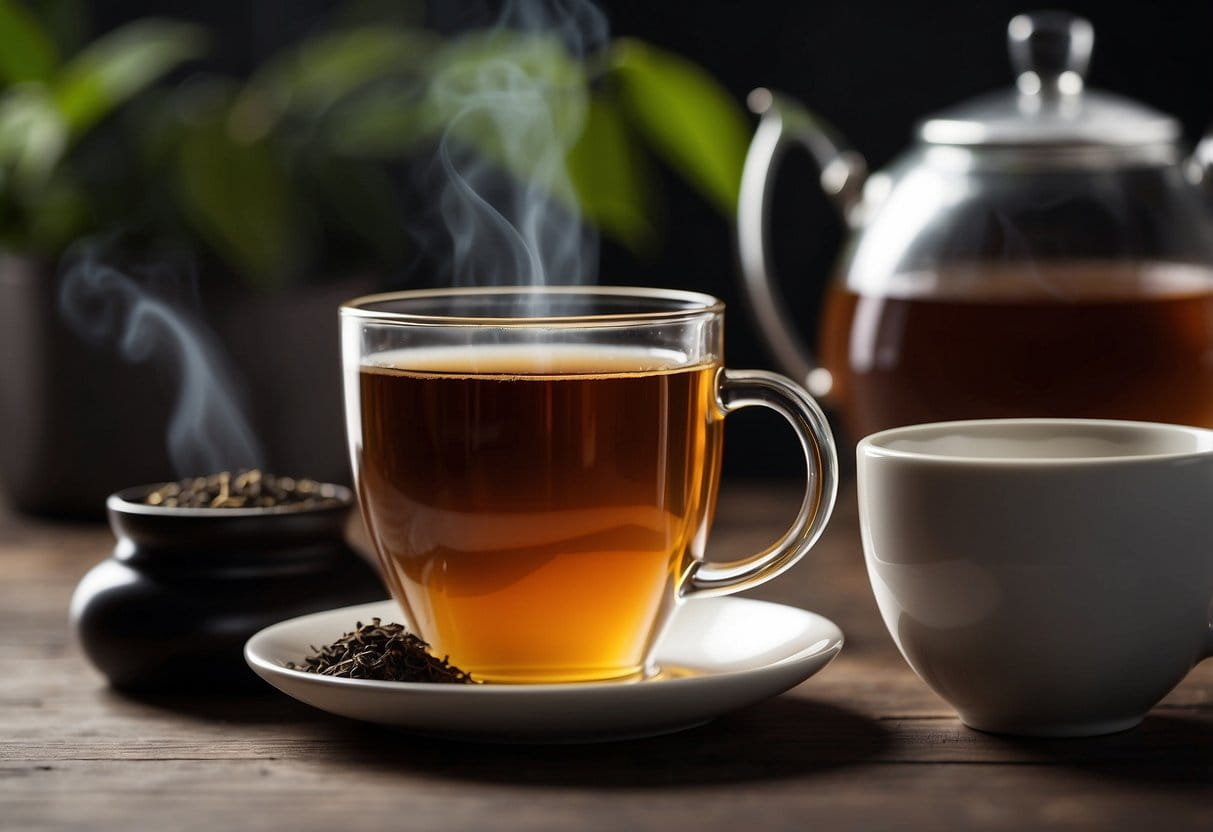How Long to Steep Black Tea
Tea steeping is the process of soaking tea leaves in water to extract flavors and nutrients. Different teas require specific steeping times and temperatures to achieve the best taste.
Key Factors
- Temperature: Black tea typically needs boiling water around 200-212°F (93-100°C).
- Time: Steep black tea for 3-5 minutes. Less time results in a lighter taste, while more time can make it bitter.
Steps to Steep Tea
- Boil Water: Use fresh, cold water.
- Measure Tea: Use about 1 teaspoon of loose tea per cup.
- Steep: Pour water over tea and let it steep for the recommended time.
- Strain: Remove leaves or tea bag to avoid over-steeping.
Experiment with different times to find your preferred strength and flavor. Remember, water quality and tea type also influence the final cup.
Black Tea Basics

Bestsellers
Understanding black tea involves knowing what it is and how to steep it properly. Temperature plays a critical role in extracting its flavors.
What Is Black Tea?
Black tea is a type of tea that is more oxidized than green, oolong, and white teas. The leaves are fully fermented, giving them a dark color and rich flavor. Common varieties include Assam, Darjeeling, and Ceylon. Black tea often has stronger caffeine content compared to other teas.
Some popular types of black tea:
- Assam: Robust and malty flavor.
- Darjeeling: Light and floral taste.
- Earl Grey: Flavored with bergamot oil.
Black tea can be enjoyed with or without milk and sweeteners.
Optimal Steeping Temperatures
Steeping black tea at the right temperature ensures the best flavor. Typically, black tea should be steeped in water heated to 200-212°F (93-100°C). Using boiling water helps to fully extract the flavors.
Here's a quick guide:
- Standard Black Tea: 3-5 minutes at 200-205°F (93-96°C).
- Delicate Black Teas (like Darjeeling): 2-4 minutes at 190-194°F (88-90°C).
Adjust steeping times based on your taste preference for strength and bitterness.
Steeping Times

Steeping times for black tea depend on various factors and recommendations from aficionados and experts. Certain elements can influence the perfect steeping duration to bring out the best flavors and aromas.
Factors Affecting Steeping Time
Several factors play a crucial role in determining how long you should steep black tea. The type of black tea, water temperature, and personal taste preferences are key elements. Some black teas, such as Assam, may require longer steeping times compared to others like Darjeeling.
Water temperature is another critical factor. Typically, black tea is best steeped at around 200-212°F (93-100°C). Lower temperatures may require longer steeping times, while higher temperatures could shorten the duration.
Your taste preference also matters. If you like a stronger cup, you might prefer to steep your tea a bit longer. Conversely, shorter steeping times can yield a milder flavor.
Lao Ban Zhang
Recommended Steeping Durations
For a standard black tea, a recommended steeping time is usually between 3 to 5 minutes. The exact duration can vary based on specific tea types:
- Assam Tea: 4 to 5 minutes
- Darjeeling Tea: 3 to 4 minutes
- Ceylon Tea: 4 to 5 minutes
- Earl Grey: 3 to 4 minutes
Using these guidelines can help you achieve the perfect brew each time. Adjust the steeping time based on your preference for a stronger or milder cup of tea.
For those who enjoy a brisk and robust flavor, aim for the upper end of these time ranges. If you prefer a lighter, more delicate taste, opt for the lower end.
Methods of Steeping
Different methods of steeping black tea can greatly affect the flavor, aroma, and overall experience. Here, you will learn about two primary techniques: one that's more traditional and another that uses a cold brewing approach.
Traditional Steeping
Traditional steeping requires boiling water heated to around 200°F (93°C). Have a teapot or a cup ready, and add the black tea leaves directly into it or use an infuser. Pour the hot water over the leaves and let it steep for 3-5 minutes.
If you prefer a stronger flavor, allow the tea to steep for the full 5 minutes. For a lighter taste, steep for 3 minutes. Be sure not to over-steep, as this can result in a bitter flavor. Once the desired steeping time is reached, remove the tea leaves or the infuser.
Cold Brew Technique
The cold brew technique offers a different taste and is more convenient for those who like to prepare tea in advance. Start by adding black tea leaves to cold water. Use approximately 1 teaspoon of tea leaves per cup of water. Place the mixture in a refrigerator and let it steep for 8-12 hours.
This method results in a smoother, less astringent flavor. Strain the leaves before serving. Cold-brewed black tea can be a refreshing option, particularly in warmer weather.
Tea Strength and Flavor
The strength and flavor of black tea largely depend on the quantity of tea leaves used and personal taste preferences.
Measuring Tea Leaves
When determining the strength of your tea, the amount of tea leaves you use is crucial. Typically, one teaspoon of black tea leaves is enough for an 8-ounce cup of water.
If you prefer a stronger brew, increase the amount to 1.5 teaspoons or even 2 teaspoons. Conversely, if you desire a milder flavor, use less than one teaspoon.
High-quality teas might require fewer leaves to achieve a robust flavor, while lower-quality teas may need more. It’s essential to experiment and find the right balance for your taste.
Adjusting Taste Preference
Adjusting the steeping time and temperature can also help you achieve your preferred flavor. Steep black tea for 3-5 minutes to balance astringency and aroma.
For a stronger flavor profile, steep for the full 5 minutes. To avoid bitterness, stay closer to 3 minutes.
Consider water temperature as well. Using water that's** just off the boil** (around 95 degrees Celsius or 203 degrees Fahrenheit) ensures optimal extraction without over-extracting tannins that cause bitterness.
Fine-tuning these variables allows you to enjoy black tea that perfectly matches your taste preferences.
Tools and Accessories

To brew the perfect cup of black tea, having the right tools and accessories is essential. The teapot and infuser type significantly impact the flavor and clarity of your tea.
Types of Teapots
Different teapots can affect your tea's taste and brewing efficiency. Porcelain and ceramic teapots are popular due to their excellent heat retention, ensuring a consistent steeping temperature. Glass teapots allow you to observe the brewing process and are easy to clean, but they can lose heat faster. Cast iron teapots have superior heat retention and durability but are heavy and must be cared for to prevent rust. Stainless steel teapots are durable and retain heat well, though they lack the aesthetic appeal of other materials.
Infusers and Strainers
Infusers and strainers are crucial for ensuring that the tea leaves are appropriately steeped. Basket infusers provide ample space for the tea leaves to expand, promoting better flavor extraction. Ball infusers are compact and convenient for single-serving brews, though they may restrict leaf expansion. Silicone infusers are flexible and come in various fun shapes, but may retain odors. Fine mesh strainers are ideal for loose leaf tea, catching even the finest particles and ensuring a clear cup of tea. Using a proper infuser or strainer ensures a clean brew and enhances your tea-drinking experience.
Common Mistakes in Steeping
Using Boiling Water:
Boiling water can scorch the tea leaves and result in a bitter taste. It is recommended to use water that has cooled slightly after boiling, ideally around 200°F (93°C).
Steeping Too Long:
Leaving the tea to steep for too long can also make it overly bitter. Typically, black tea should steep for 3-5 minutes.
Using Too Much or Too Little Tea:
The ratio of tea to water is crucial. A common guideline is one teaspoon of tea leaves per cup (8 oz) of water. Adjust to taste if needed, but avoid extreme deviations.
Not Using Fresh Water:
Old or previously boiled water can affect the flavor. Always use fresh, cold water to ensure the best taste.
Improper Lidding:
Not covering your tea while it steeps can lead to a loss of heat and volatile oils, affecting the final flavor. Always use a lid or cover.
Poor Quality Tea Leaves:
Using low-quality tea can result in a lackluster beverage. Investing in good-quality tea makes a significant difference in both taste and experience.
Overcrowding Leaves:
Tea needs space to expand and release its flavors. Overcrowding leaves in a small infuser restricts this, leading to uneven steeping. Use an appropriately sized infuser or teapot with ample space.
Health Considerations

Black tea offers both benefits and risks for your health. Key points to consider include its caffeine content and potential health impacts.
Caffeine Content
Black tea contains a moderate amount of caffeine, about 40-70 milligrams per 8-ounce cup. This stimulant can help improve alertness and concentration.
Caffeine sensitivity varies among individuals. Some people experience jitteriness, while others may have trouble sleeping if they consume tea later in the day.
To manage your caffeine intake, consider how many cups you drink daily. Decaffeinated black tea is an option if you are sensitive to caffeine or have been advised to limit consumption due to health concerns.
Potential Benefits and Risks
Black tea is rich in antioxidants like flavonoids which can help protect your cells from damage. Regular consumption might reduce the risk of heart disease and lower bad cholesterol levels.
However, excessive intake can pose risks. Too much caffeine can lead to anxiety, digestive issues, or increased heart rate. It is also possible to develop a dependency on caffeine, leading to withdrawal symptoms if you suddenly stop drinking it.
Balance is crucial. Enjoying black tea in moderation allows you to benefit from its positive properties while minimizing potential negative effects.
← Older post Newer post →











